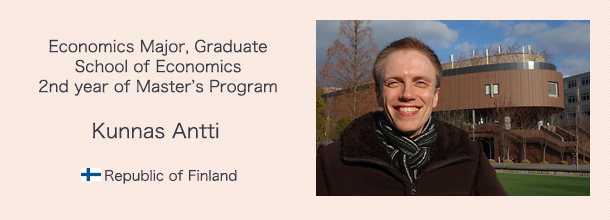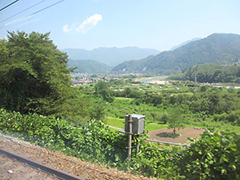

Study at Kansai University
Comments from current international students
Kunnas Antti (Republic of Finland)

You only live once, so I want to try everything that I can
Reasons for choosing Kansai University
Ever since I was young, I had an adventurous spirit, and had a strong desire to challenge myself into trying new things, unknown things, and exciting things. I also liked languages, and during my high school years, I studied six different languages. It was during that time that I first came in touch with the Japanese language. I was really drawn to it because it was so different in grammar, pronunciation, and looks from any of the other languages in Europe, and so, I started studying it. I spent about three years studying hiragana and kanji on my own through anime, dramas, and Japanese language study books. In the end, I think I memorized at least 1,500 kanji letters. After that, I went on to study business administration at a university in my home country, but meanwhile, I used the school's exchange student system to go and study at a partner institution in Osaka for 10 months. Since I had never attended any proper Japanese language classes until then, it was difficult at the beginning, because I couldn't understand a word of what the people around me were saying. At that time, I really couldn't speak Japanese. Every time my homestay family would speak to me, I couldn't give an immediate answer and would often stop after saying "anoh..." [meaning "umm..."], so much so that my host family's grandmother ended up calling me "Mr. Anoh." Later, through the process of interacting with Japanese friends, my host family, and my university's professors, I gradually started to learn the Japanese language. Now, my Japanese level is much better than what it was then, but my former host family's grandmother still calls me "Mr. Anoh." After graduating, I felt that I wanted to learn the Japanese language more, and also wanted to delve deeper, more academically, and more specifically into the study of business administration that I had been pursuing until then. Just when I was thinking seriously about going abroad to study at a graduate school in Japan, I was introduced to my current professor from a professor that I had met during my exchange student days. I found that it matched perfectly with the field of expertise that I wanted to study in, and that is how I decided I wanted to go to Kansai University's Graduate School.
Problems encountered with life in Japan
I get asked this question often, but I can't think of anything in particular. In Finland, we have a draft system, which requires you to be drafted into the military for one year. I acquired the ability to have strong patience during my service in the military, and I also learned about leadership, being thoughtful of others, and working in cooperation with others. Individualism remains strong in the worldview of the European countries, but perhaps because I experienced service in the military, I didn't have any negative reactions to Japan's distinct collective mentality, and was able to adjust quickly. I also loved Japanese culture, such as anime and drama, so I didn't encounter much cultural shock. What I felt strongly after coming to Japan is that if you can't understand the local language, you can't understand the local culture in the true sense. Before I acquired a deep understanding about Japanese language and culture, I thought Japan was a mysterious country with many strange things. But by studying in Japan, I learned to have a deeper and closer affinity towards the appeals of the country and people of Japan.
About my studies
Right now, I am in the midst of writing my thesis, in which I do a comparative study of the economies in Finland and Japan during the mid-20th century. The summer Olympics in 1940 was supposed to be held in Tokyo, but because of World War II, that never happened. Coincidently, the city that was supposed to host the Olympics after Tokyo was Helsinki, in my homeland of Finland. However, just as with Tokyo, the Olympics could also not be held in Helsinki because of World War II. I am doing my research on how the cancellation of the Olympics in these two cities affected the economic developments in Finland and in Japan.
About student life
I am enjoying my student life very much. Basically, all of my hours are spent in research. All hours other than those spent at my part-time job are spent holed up in the research room and writing my thesis. The Graduate School at Kansai University is kept to a small number of students, so we are able to have in-depth discussions. The school also has good environment to support our studies, such as a library and the IT center, and I am very happy with the facilities. They also have a co-op store on campus, so that I can purchase everything that I need for my daily living. I never thought I would find a barber inside the campus! At the Senriyama Campus, there are many stores for students in the campus surroundings, so I never had problems with my daily living. Japan also has good public safety, so I went out and tried many different things. For example, this summer, I went on a trip to Tokyo, but instead of using the Shinkansen or the airplane, I used the "Seishun 18" train ticket to go to Tokyo. This is a ticket where you use the local trains to travel between Osaka and Tokyo, riding on trains that stop at every station counting a total of approximately 130 stations. But the slowly changing views from the trains were magnificent, and it became a memorable experience. I think it is important in life to never forget your adventurous spirit. I always think that I want to challenge my possibilities, to see how far I can go. I don't really like the word "dekinai" (meaning, "I can't do it"). I hope that people who say "dekinai" wouldn't say so, but would make the effort to believe in their own possibilities and take action to try anything.
Future dreams
After finishing my Master's Program, I am planning to work at a major Japanese company that is developing its business globally. Compared to European countries, the method of management at Japanese companies places more focus on the customers, which appeals to me because it has a sense of human touch. I'm excited to see what I can do and how much I can grow after entering the company. I could advance smoothly in that company and become a President, or, I may encounter a major obstacle and leave, and then take on a completely different challenge on the other side of the world. I heard that in the United States, management personnel of bankrupted companies have a competitive edge in the job market. That is because they are thought to have experienced many failures, and would thus use the experiences they had gained by those failures to bring positive influences to the company. Even if you have a negative experience, I believe that experience can be changed into a positive one by what kind of mentality you have after that. While working for a Japanese company, I would like to learn about Japanese-style management that could be applied globally, and I myself would like to become a person of the world and work actively at a global level.
Message for students who are hoping to enter Kansai University
First, I would like for you to question everything that you have ever learned before. What you learned at school, learned from your parents, or seen in the news... If something interests you, go and actually see that place. Otherwise, you won't be able to understand it in the true sense, and you can't move on to the next step. Also, regardless of study abroad, if something interests you, whatever it is, you should try it. Knowledge that may not be of immediate use to you will be an asset, and will broaden your future possibilities. And really ask yourself, what kind of a person do you wish to be in the future? And then, think about what you need to do to realize that dream, and once you make a decision, give every effort toward achieving your goal. There will always be difficulties during your study abroad. But I believe people are able to grow for the amount of difficulties that they experience. If you are interested in Kansai University, please come and actually visit Kansai University and see it for yourself. It has a wonderful campus. I think it will help you come one step closer to achieving your dreams.
What I enjoyed about my student life
I love searching for a sight of Japan that I would not be able to see through regular life in Osaka. Every year, I purchase the "Seishun 18" train ticket and go from the cities to different far-out places in Japan. I enjoy the slow-moving tempo of the hours during those trips.
Note: This interview was held in December 2013.



















